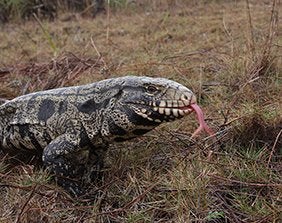Wild hogs, coyotes and snake fish have long been a problem as invasive species of wildlife in Georgia and South Carolina. Now, the tegu is making an appearance on land along the Savannah River becoming yet another non-native apex predator rampaging through the American south.
The tegu is a giant lizard that grows to over four feet in length and weighs 10 pounds.
The animal, according to the U.S. Army Corps of Engineers, has been spotted from Florida to Georgia in areas all the way up the Savannah River to Lake Hartwell and the species is encroaching in space all over the midlands of South Carolina, according to the SCDNR.
MORE: Savannah Riverkeeper Monitoring E. coli Levels at Betty’s Branch
P.J. Perea, spokesperson for the Savannah River Ecology Lab, says that the lizard, which is a native of Argentina, became a sort of fad pet for folks living in Florida. Once the owners discovered the size that the animals became, they released them in the nearest waterway.
The released animals began mating and created colonies in Florida that grew large enough to spread out across the temperate parts of the southern United States,
The giant lizards have migrated — as part of the exotic animal trade — from Argentina to North America by way of Florida. The tegus that were released or escaped in Florida thrived in the wild and they have moved on a slow march northeast for years.
[adrotate banner=”30″]
The black and white tegus have no natural predators and can eat anything from endangered gopher tortoises to the eggs of nesting birds like whippoorwills and wild turkeys.
The lizards are also said to be fond of American alligator eggs, a species that is closely managed. Hunting of alligators is allowed in Georgia, but should a sudden loss of the species numbers occur, then the alligator might be placed back on the endangered list and hunting would be forbidden.
Normally, the tegu lizards are not a threat to humans, but small pets can be prey for the animals and a bite can be quite painful.
MORE: Protecting South Carolina’s Underwater History
Tonya Bonitatibus, the director of Savannah Riverkeeper, said the species is particularly harmful because of its adaptability, and the fact that it has no predators.
“They are the lizard version of wild pigs. They tear up everything and eat almost anything and they are fast,” Bonitatibus said. “I hate to say this, but if anyone encounters a tegu, shoot it if you can, then turn the carcass over to the DNR for study.”
Scott Hudson is the Senior Reporter for The Augusta Press. Reach him at scott@theaugustapress.com.
[adrotate banner=”51″]










